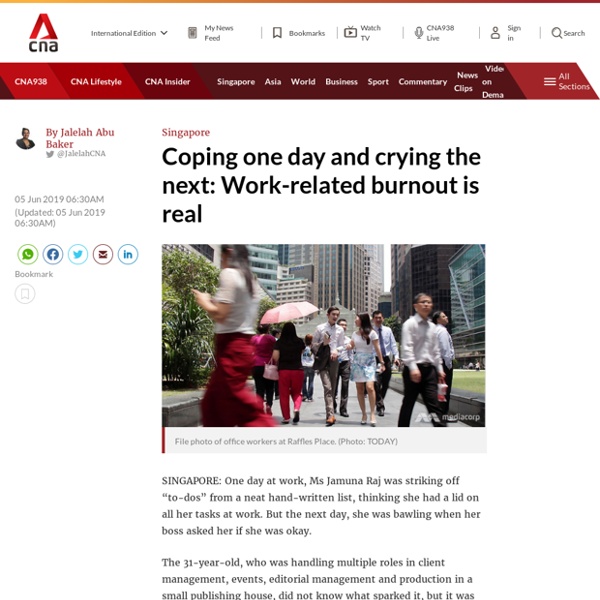Singapore's most stressed out millennials on working long hours and dealing with anxiety at work
I can't remember the last time I heard a young Singaporean say that they were genuinely excited about the prospect of getting into the office in the morning, even if they were deeply passionate about their field of work. Instead, often times, they expose a toxic work environment where stress and anxiety skyrocket while self-confidence plummets as a result of slave-driving superiors, a overwhelming workload, miserable working hours that extend far beyond the standard 9-to-5 with no reward, and even the possibility of retrenchment in the near future. If all the above sounds a little too dire to be true, you'll only need to look at the findings of the 2019 Cigna Well-Being Survey, which revealed a staggering 92 per cent of of working Singaporeans feel stressed in the workplace with debilitating effects such as lowered morale.
Stress: Signs, Symptoms, Management & Prevention
What is stress? Stress is the body's reaction to any change that requires an adjustment or response. The body reacts to these changes with physical, mental, and emotional responses. Stress is a normal part of life.
Keep calm and join a mindfulness workshop, Lifestyle News
A group of mothers are seated on the floor in a circle, some with babies on their laps. They may sit in silence, focusing on their breathing. At times, they may be eating tangerines at a deliberate, slow pace.
Being in the Sandwich Generation
Are you part of the sandwich generation? One of the burdens assumed by adult children is caring for their aging parents while dealing with their own children at the same time. According to Pew Research Center, about one out of every eight Americans between the ages of 40 and 60 care directly for an aging parent while an additional seven to ten million Americans help their parents or other aging relatives even from a long distance.
Burnout Self-Test
© iStockphotoAVTG Are you at risk of burning out? Burnout occurs when passionate, committed people become deeply disillusioned with a job or career from which they have previously derived much of their identity and meaning. It comes as the things that inspire passion and enthusiasm are stripped away, and tedious or unpleasant things crowd in. This tool can help you check yourself for burnout.
TODAYonline: Sleep-deprived Singaporean workers among most stressed globally: Survey Read more at
SINGAPORE — Singaporeans are not only sleep deprived, but they are also among the most stressed at work globally, according to a survey by health service company Cigna released on Tuesday (Mar 26). Nearly 92 per cent of Singaporeans surveyed were stressed from work, which was higher than the global average of 84 per cent. Of this group, 13 per cent said that the stress they faced was unmanageable. Singaporeans’ physical wellness index also dipped by 4.4 percentage points from last year, which the survey attributed to an increase in sleepless nights.
stress – APA Dictionary of Psychology
n. 1. the physiological or psychological response to internal or external stressors. Stress involves changes affecting nearly every system of the body, influencing how people feel and behave. For example, it may be manifested by palpitations, sweating, dry mouth, shortness of breath, fidgeting, accelerated speech, augmentation of negative emotions (if already being experienced), and longer duration of stress fatigue. Severe stress is manifested by the general adaptation syndrome. By causing these mind–body changes, stress contributes directly to psychological and physiological disorder and disease and affects mental and physical health, reducing quality of life.
13 Affordable Yoga Studios in Singapore With Classes Under $20 Each
Photo: Yoga Movement If the financial commitment of unlimited class packages or monthly gym membership is holding you back from taking the first step to learning yoga, turn to these wallet-friendly alternatives instead. These boutique yoga studios offer 20- to 30- class packages that work out to be $20 or less for each session. All that money you save can then be channelled to expanding your activewear collection!
Sandwich generation: 9 tips for managing your unique stress
The "sandwich generation" is made up of people who are simultaneously taking care of their children and helping their aging parents. Predictably, this causes a lot of stress. At times, it can feel impossible to manage everything. You're only one person, after all!
Workplace stress – an occupational health case study
This case study on workplace stress shows how the evidence base for occupational health underpinned a successful intervention. Anne Donaldson and Anne Harriss explain. Stress, anxiety or depression underpin much work-related ill health, accounting for 9.9 million days of sickness absence in 2014-15, with, on average, 23 days lost per person. It resulted in 35% of all days missed from work due to ill health. Industries reporting the highest prevalence of ill health from work-related stress included health and social care, teaching, public administration and defence (HSE, 2015).



